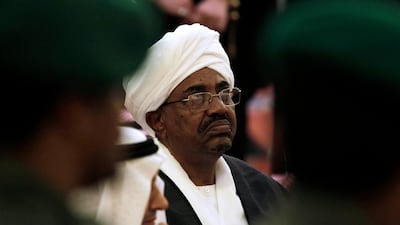Omar Al Bashir’s 30-year autocratic rule has come to an end, marking the fall of one of the region’s longest-standing leaders and blowing open the future of a country ruled by a man whose aim was not to govern but to survive.
Protests began in December against the authoritarian Mr Al Bashir over growing disenfranchisement by the country’s young population living under an ailing economy. Many of the most active protesters were among the majority youth population who have never lived under any other leader.
A former military general, Mr Al Bashir seized power in a military-backed coup in 1989 and manage to consolidate power in the years following his seizure by cracking down on dissent. His own brand of rule mixed a strategy of divide and rule among close allies with his national “Islamic experiment” that saw him harbour and befriend religious extremists.
"When he came to power, he dissolved all the political parties, the trade unions and sacked anyone who wasn't a loyalist – over 120,000 civil servants. He created a structure whereby if you're not part of the Islamist movement, you didn't exist," Reem Abbas, a Khartoum-based journalist, told The National.
The initial purge allowed Mr Al Bashir to consolidate his rule, but it didn’t bring stability, says Murithi Mutiga, Deputy Project Director of the Horn of Africa at International Crisis Group.
“That initial wave of purges gave him space to rule for some time, but then Sudan continued to face multiple pressures – his management of the economy has always been characterised as inept, the bureaucracy is very tangled and slow,” he said. “Investment has been sclerotic, but very significantly Bashir opted to an armed response to the insurgency waged by South Sudan’s leaders. His calculation has proved to be not very wise.”
Mr Al Bashir waged wars against separatists in the country’s south between 1983 and 2005, until the region broke away in 2011 to become the world’s youngest nation. South Sudan took with it much of the country’s oil reserves, cutting Khartoum off from a vital source of income.
Internally, the president has pitted allies against each other and turned former-friend on friend to prevent any one faction with influence gaining enough support to remove him.
Through the 2000s he used oil-financed patronage to support or isolate anybody at a whim. This kept him in office and helped him survive numerous embryonic coups but ultimately might explain why few former allies appear to have publicly backed him as the army moved in to remove the president on Thursday.
“Given that this is a regime that survives primarily through patronage, it is a regime that spends approximately 70 per cent on its security forces, it is a regime built to survive not to govern adequately,” said Mr Mutiga. “This spelt the end of Bashir’s time at the helm."
The obsession with security spending also bred anger among people who saw little of the benefit from oil revenue through the 2000s.
"We saw very significant protests in 2013 and in 2009, but this is the most determined attempt we have seen... we see people protesting in big cities, small towns and it’s not limited to one certain group, but a large portion of the population," said Mr Mutiga.
Internationally, Mr Al Bashir is wanted by the International Criminal Court for suspected war crimes in Darfur. The allegations against Mr Al Bashir have left him with limited movement since the first ICC warrant was issued for his arrest in 2009. His charge sheet has been updated several times since with fresh allegations.
Under Mr Al Bashir, Sudan has had fraught relations with the West. The US designated the country a state sponsor of terrorism in 1993 when the country was hosting Al Qaeda head Osama bin Laden, it imposed sanctions on Khartoum and in 1998 the US fired cruise missiles against the Al Shifa pharmaceutical factory in Sudan after alleging it was being used to make chemical weapons.
Khartoum’s response to the Darfur insurgency led to an extension of US sanctions under George W Bush in 2007 but co-operation on terrorism after the September 11 attacks did build some bridges.
Under the last US administration, talks began about removing sanctions and in 2017 the US lifted many of the restrictions.
Sudan in recent years has sought improved relations with is neighbours as well. Its influence in South Sudan saw it help broker a peace deal – albeit yet to be implemented – between rebel leader Riek Machar and President Salva Kiir.
With its northern neighbour, Egypt, it has also mended fences as Cairo seeks support in a dispute with Ethiopia over a Nile River dam.
Of particular concern in Cairo in recent years has been Khartoum’s relations with Iran and Qatar as well as support for Muslim Brotherhood groups and opponents of Egypt’s allies in Libya.
But under Egyptian President Abdel Fattah El Sisi, Cairo has reached out and bolstered ties.
Despite the diplomatic changes in recent years, many in Sudan are desperate for real change and an end to deteriorating living conditions. While they push for democratic transition, they will live through a two-year military-led transition. What that will bring and what Mr Al Bashir’s ultimate legacy will be is yet to be seen.

